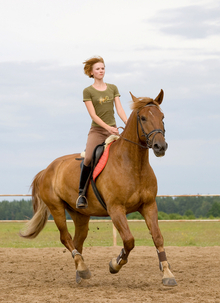As reported in the Equine Veterinary Journal, one hour of exercise a day, regardless of the type, takes the edge off of stabled horses, researchers have found. The study by R. Freire, P. Buckley and J.J. Cooper also examined whether four different forms of exercise were equally effective in reducing unwanted behavior from horses housed in stalls.

Importance of daily exercise for better horse behavior
All types of exercise left horses in a more cooperative and less reactive mood. This was reflected in less vocalizing while being handled and in taking less time to load onto weight scales.
Two dozen horses, including thoroughbreds and part-thoroughbreds, received an hour of exercise daily with one of the four methods. Some horses used a walker, others a treadmill, while another group had free turnout, and a fourth group of horses was ridden. Every few days, each horse's behavior was evaluated while being handled for weighing and then while loading in and out of a trailer.
Each horse was also released on its own into an arena for 15 minutes while its activity was documented to assess rebound behavior. The researchers considered rebound activity as an indicator of the horse's previous behavioral deprivation, resulting from being confined to a stall four metres (13 feet) square.
For comparison, during another period when the same horses went without daily exercise, they received the same behavior assessment routine.
The researchers observed that horses given daily exercise did less walking, trotting and cantering when let loose in the arena, even when the exercise only consisted of walking. Those horses that had turnout did the least amount of cantering, and seldom bucked or rolled during their freedom in the arena.
Horses exercised by walking or riding usually bucked two or three times while in the arena. This difference suggests that turnout was the most effective exercise regime.
Meanwhile, horses without any daily exercise let out six or seven bucks and also rolled once or twice during their 15 minutes at liberty.
All types of exercise left horses in a more cooperative and less reactive mood. This was reflected in less vocalizing while being handled and in taking less time to load onto weight scales. Whether they got exercise made no difference, however, in how horses behaved during trailer loading.
While this study doesn't indicate whether one hour of exercise is ideal or even enough for a stabled horse, it does show that an hour of activity makes a significant difference in a horse's behavior.
The greatest benefits come from allowing horses free turnout, rather than providing exercise with just a walker, a treadmill or by riding.
